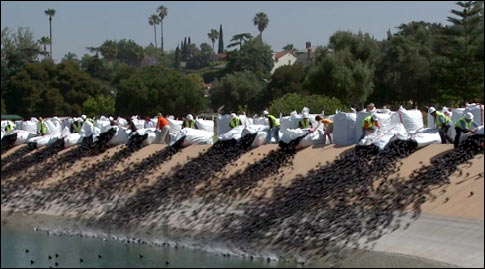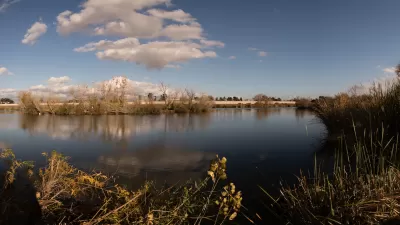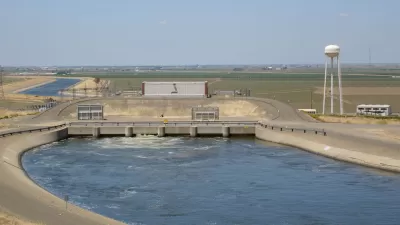Adaptation is a way of life. But we humans have been building our habitats and cities in pursuit of permanence. This is an unreachable goal. Making our cities and communities and lifestyles adapt to outside influences is typically an afterthought. We do tend to react, and we often react very effectively. But solving problems before they happen has never been a strong suit when it comes to urban development. This is especially true with regard to our impacts on the environment. A recent and bizarre example illustrates this point.
Adaptation is a way of life. But we humans have been building our habitats and cities in pursuit of permanence. This is an unreachable goal. Making our cities and communities and lifestyles adapt to outside influences is typically an afterthought. We do tend to react, and we often react very effectively. But solving problems before they happen has never been a strong suit when it comes to urban development. This is especially true with regard to our impacts on the environment. A recent and bizarre example illustrates this point.
The example revolves around water, and takes place in Los Angeles. The city is geographically a desert where water is naturally in low supply -- but because of the marvels of modern engineering and science it is now plentiful enough to meet the staggering demand of 4 million residents.
Reservoirs feed this demand for much of the city. These are big pools of water, often containing tens- to hundreds-of-millions of gallons of water. Like all those abandoned pools in the backyards of America's foreclosed suburban homes, reservoirs get kind of nasty unless they're treated. The chemical chlorine is the most common treatment.
Because water attracts life, bacteria forms in these reservoirs that can be harmful to people and other animals if ingested. So we've solved this potential problem by adding chlorine to the reservoirs. Another chemical that naturally exists in L.A.'s reservoir water is bromide. This is where the problem comes in.
In shorthand, bromide plus chlorine plus sunlight equals cancer.
When sun shines on the water, the chlorine used to keep it clean, and the bromide it contains, a carcinogen forms and effectively poisons the drinking water of hundreds of thousands of people.
But there is a solution: take sunlight out of the equation. Earlier this month the Los Angeles Department of Water and Power began a months-long process of "shading" reservoirs of concern. They're doing this by dropping millions of black-colored plastic balls into the reservoir. The balls are intended to float on the surface and block the sunlight from penetrating the water and causing the carcinogenic reaction.
Balls being dropped into L.A.'s Ivanhoe Reservoir. Click the picture to view a video from the Los Angeles Times.
Technically the problem is solved. It's an impressive and innovative solution, and one that makes for a great picture. But it stands as another reminder of the unintended consequences of human action. We had a need that nature didn't serve, so we created a solution. Our solution in turn created a problem. Now we've solved that problem, but what will follow?
We need water, and too many people in the Los Angeles desert rely on the reservoirs to get rid of them. We're stuck in what may end up being a long chain of problems responding to solutions responding to problems again and again.
Human ingenuity is truly amazing, and they way we can solve problems like this is encouraging for our future. But it also should make us pause for a moment and ask ourselves whether we want to keep living a life that continually needs a new bandage over the wound, a new finger in the levee crack, a new source for those most basic needs that keep us alive.
As our cities have faced a number of environmental challenges over the years, we've proven again and again that we can adapt after the fact. Now we need to focus on adapting our approach to development so that we won't need to enter the endless cycle of acting and reacting.

Planetizen Federal Action Tracker
A weekly monitor of how Trump’s orders and actions are impacting planners and planning in America.

Maui's Vacation Rental Debate Turns Ugly
Verbal attacks, misinformation campaigns and fistfights plague a high-stakes debate to convert thousands of vacation rentals into long-term housing.

San Francisco Suspends Traffic Calming Amidst Record Deaths
Citing “a challenging fiscal landscape,” the city will cease the program on the heels of 42 traffic deaths, including 24 pedestrians.

Defunct Pittsburgh Power Plant to Become Residential Tower
A decommissioned steam heat plant will be redeveloped into almost 100 affordable housing units.

Trump Prompts Restructuring of Transportation Research Board in “Unprecedented Overreach”
The TRB has eliminated more than half of its committees including those focused on climate, equity, and cities.

Amtrak Rolls Out New Orleans to Alabama “Mardi Gras” Train
The new service will operate morning and evening departures between Mobile and New Orleans.
Urban Design for Planners 1: Software Tools
This six-course series explores essential urban design concepts using open source software and equips planners with the tools they need to participate fully in the urban design process.
Planning for Universal Design
Learn the tools for implementing Universal Design in planning regulations.
Heyer Gruel & Associates PA
JM Goldson LLC
Custer County Colorado
City of Camden Redevelopment Agency
City of Astoria
Transportation Research & Education Center (TREC) at Portland State University
Jefferson Parish Government
Camden Redevelopment Agency
City of Claremont






























